How US comedians are taking back comedy from the left
In the age of Trump, social media and podcasts, right-leaning comedians are finding mass audiences in the US. Interestingly, this shift has yet to take root in Australia.
Andrew Schulz’s latest Netflix special, LIFE, unpacks the “wildest moment of his life – becoming a father’’. It’s the American comedian’s most personal show to date. In it, the lifelong New Yorker recounts his and his wife’s IVF journey, which culminated in the birth of their daughter, now aged one.
Yet within the first few minutes of this hour-long comedy special, Schulz drops one liners into his family narrative targeting gay sex and doctors “fingering” his wife during labour, while briefly highlighting the far right’s fears immigrants will replace white people. During the show, he also tells funny, self-deprecating stories about his hit and miss experiences producing sperm at an IVF clinic.
With almost five million followers on TikTok and 4.4 million on Instagram, the stand-up comedian and podcaster is part of a new wave of conservative American comedians who are eroding the left’s dominance of US comedy. In past decades, it was widely assumed that, with some notable exceptions, there was no mass market for conservative or libertarian comedy in America as small “l” liberals exercised a near-monopoly on the entertainment form.
The rise of Donald Trump, podcasts and other digital platforms have ushered in a new reality, and with it, a blizzard of wildly anti-PC punchlines: As Vanity Fair recently reported: “The right has its very own ecosystem of entertainers and comedians, enormously popular figures that many on the left are blissfully unaware of.’’
Schulz is part of that ecosystem, and in a 2025 performance at Madison Square Garden he told Jewish audience members they should feel safe at the venue. The comedian went on to say that “all the lesbians are up at Columbia (University) so you’ve got nothing to worry about. Those lesbians done took over the Palestinian protest.’’ What followed was a ribald joke about sex, carpets and why lesbians cared so much about Muslims.
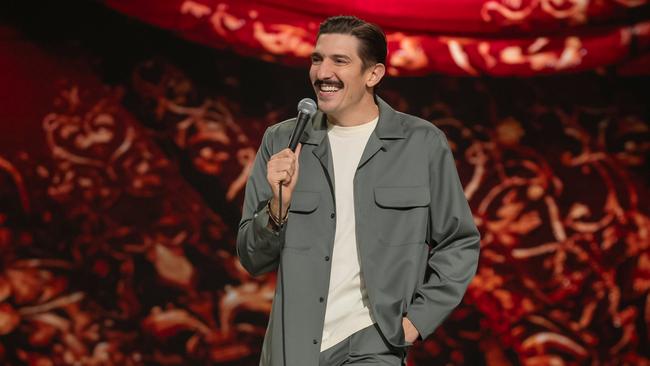
Apart from his insult humour, Schulz is on people’s radars for another reason: he interviewed Trump ahead of his 2024 re-election on his podcast Flagrant, which he co-hosts with fellow comedian Akaash Singh. While happy to poke fun at trans women in “women-women’s sports” or campus lesbians, Schulz does not always present as a MAGA true believer. In his interview with Trump, he guffawed at the then-presidential candidate’s claim he was “basically a truthful person”. The Los Angeles Times said of the controversial comedian: “No matter where people stand on Schulz’s point of view on comedy, his mark on pop culture with his punch lines has become unquestionable.”
Nick Marx and Matt Sienkiwicz, co-authors of the book That’s Not Funny: How the Right Makes Comedy Work For Them, have argued that in the wake of Trump’s 2024 election victory, while left-leaning TV comedy host “Jimmy Kimmel cries and Jon Stewart rants, the right wing in the US has successfully depicted itself as the new home for free speech and cutting edge comedy’’.
Interestingly, this shift towards conservative comedy has yet to take root in Australia. Dr Mark Rolfe, an academic and co-editor of the 2024 essay collection Moral Dimensions of Humour, told Review “the economics (of Australian comedy) is very weak compared to America’’ and that “we don’t have that same polarisation. We therefore don’t have a comedy industry or profession that is tapping into, exploiting or just embodying that (division).’’
Australian comedian Daniel Muggleton, who is touring his show You May Be White, I May Be Crazy nationally, agrees there is little evidence of a conservative comedy wave breaking on our shores. “I don’t think Australian comedy is or has ever been as political as American comedy,’’ he says. The law graduate whose stand-up clips have been viewed more than 20 million times across social media platforms, believes local audiences are “absolutely” up for nuanced comedy and in a sign of this, he makes a living telling jokes about the changing meaning of Australia Day, bogans and meat trays.
Key players in America’s conservative comedy sphere – which spans social media, YouTube, stand-up shows, podcasts and cable television – include Schulz, libertarian podcaster Joe Rogan and Theo Von, a comedian and podcaster with a mullet, Southern drawl and more than seven million followers on Instagram and TikTok.
Trump also appeared on Rogan’s and Von’s podcasts in the run-up to the 2024 US election and this helped the Republican candidate secure the votes of young men that, in turn, propelled him back into the White House. Despite this, Rogan has hosted anti-Israel commentators on his show, while this month, a video by Von claiming a “genocide” was taking place in Gaza and that the US was complicit, attracted 18 million views.
As many readers will know, at a Trump campaign rally last year, comedian Tony Hinchcliffe infamously described Puerto Rico as a “floating island of garbage”, a racist slur from which Trump’s team distanced itself. Hinchcliffe refused to apologise, claiming “I made fun of everyone … watch the whole set’’. Underscoring the new tolerance for intolerant humour in the US, the comedian has since landed a three-show deal with Netflix. The first show, Kill Tony or Be Killed, is currently streaming and features aspiring comedians who have one minute to win over a panel that includes a Trump impersonator and the titular host.
On US cable television, top-rating Fox News host Greg Gutfeld has loosened the left’s vice-like grip on late night TV comedy. Gutfeld regularly out-rates long-running shows hosted by Stephen Colbert, Kimmel and Jimmy Fallon, as well as The Daily Show, by skewering liberal hypocrisies. The host, who targets everything from identity politics to Volodymyr Zelensky’s stature and leftist media who “manipulate the narrative”, told Variety his competitors were losing audience share because they stuck to “a very narrow, agreed-upon groupthink” and therefore can “never be funny”.
Susan Provan is director of the Melbourne International Comedy Festival, Australia’s and the world’s largest event of its type. Provan says the Australian comedy scene embraces “comedians across the (political) spectrum. They are probably slightly more left-leaning than they are right-leaning, but there is definitely a very wide spectrum.’’ However, when asked to name conservatives on the local comedy circuit, she can’t. “I can’t really think of anyone offhand because they’re not sort of loud in the festival, but I don’t want to offend anybody. … I know they’re out there, but maybe they don’t so much do the festivals,’’ she says.
Provan says that at her festival, which reaches about 700,000 people every year, cancel culture-style threats are not an issue. “We all just want artists and audiences to be respectful and kind,’’ she says. “… I think most of the people that I work with and who participate in our festivals are the kind of artists … that don’t punch down. If you’ve got to punch, punch up.”
One right-of-centre Australian comedian, who did not want to be identified, claimed the extraordinary influence of one entertainment company with close relationships with the ABC, Channel 10 and comedy festivals had engineered a pipeline of soft-left comedians who had dominated the local scene for decades. He said that at times, this company’s influence had been monopolistic, “the likes (of which) you wouldn’t find in any other business’’. The source claimed this made it difficult for conservative humorists to secure TV or major festival exposure here.
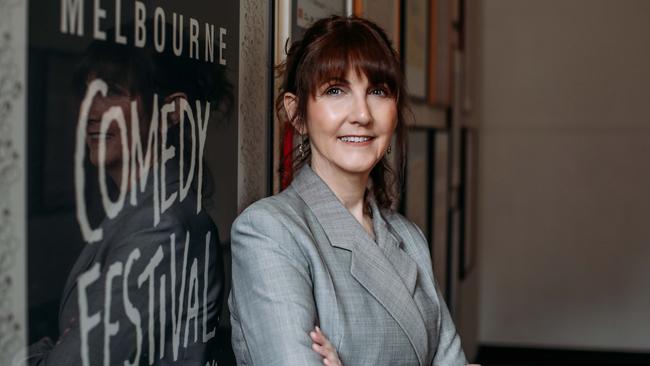
The rise of right-leaning American comedy has closely paralleled the rise of social media and the manosphere – the websites, podcasts and forums said to promote traditional masculinity and anti-feminist views. The world’s most successful podcaster, Joe Rogan, describes himself as a comedian and podcaster, and frequently has conservative humorists on his show. He has also established an influential comedy club, Comedy Mothership, in Austin, Texas.
For all its libertarian values, the venue’s website warns that “comedy is subjective and certain comedians are not for everybody’’, while patrons’ phones are placed in secure bags to prevent filming of performances. Conservative Australian comedian James McCann is currently touring the US and has performed at the Mothership. He did not want to be interviewed for this article.
Writing for The Conversation last year, Marx, from Colorado State University, and Sienkiwicz, from Boston College, said that with their leftist, righteous anger, American shows such as Jon Stewart’s The Daily Show, The Colbert Report, Full Frontal with Samantha Bee and Patriot Act with Hasan Minhaj, had failed to keep abreast of emerging trends in comedy. “For liberals to reconnect with young voters – especially young men – we think they have to reinvent political comedy. Doing so will mean moving beyond the haranguing that has long been its primary delivery style,’’ they said.
In their book, Marx and Sienkiwicz say their readers will find “many of these (conservative) comedians utterly appalling, some surprisingly funny, and others just plain weird’’. They warn that some outgrowths of the “right-wing comedy complex” are not just morally questionable but evil. “Algorithmic suggestions on YouTube, retweets on Twitter, cross-promotion on podcasts – provide a set of pathways that connect more banal right-wing humour to the truly evil stuff, up to and including actual neo-Nazi comedy spaces,’’ they write.
Rolfe, an honorary lecturer at the University of NSW, says that while right-of-centre comedians and podcasters claim they are standing up to the authoritarianism and political correctness of the left through humour, “previously it was the left who were saying, we own comedy, or more specifically satire, because satire is always punching up at the establishment and conservatives can’t do that because they are the establishment’’.
However, he believes the notion, pushed by university scholars, that the left owned comedy is “basically rubbish’’. He points out 18th century satirist Jonathan Swift was a Tory, while in the 1980s US shock jock Rush Limbaugh built a huge following through satire. Limbaugh attracted millions of listeners by sending up Bill Clinton and Ted Kennedy, playing a parody of the Dion song, The Wanderer, rebadged as The Philanderer. More controversially, Limbaugh would broadcast the “the so-called abortion call” – the sound of a vacuum cleaner followed by the cries of a baby.
“My larger point is that satire has always been part of our political systems,’’ Rolfe says. In the online world in Australia, he notes how the satirical Betoota Talks podcast has featured interviews with both sides of politics, while the left-wing YouTuber and blogger Friendlyjordies (aka Jordan Shanks) – who once called a former Liberal female MP a “whiny little bitch” – has aligned himself with the ALP.
In April, British and Australian journalists reported that Logie winner Chris Lilley – whose TV mockumentaries featuring him in black, brown and yellow face were dropped from Netflix in 2020 – was poised to make a small-screen comeback. The reports said Lilley’s new TV show would focus on Mr G, the outrageously narcissistic drama teacher from Summer Heights High, which, before its cancellation, was one of the ABC’s biggest comedy hits.
It soon emerged the popular character would be resurrected solely through a podcast called Mr G’s Room – a cautious approach that underlines the differences between the American and Australian comedy scenes. While a defiant American comedian (Hinchcliffe) who made an openly racist remark about Puerto Rico gets a Netflix deal, new material from Lilley remains conspicuously absent from our TV screens.
Lilley’s announcement about his Mr G podcast garnered more than 170,000 likes on Instagram. This is despite the fact Summer Heights High and its spin-off mockumentary, Jonah from Tonga, are now seen as deeply problematic because Lilley played troubled teenager Jonah Takalua in brown face.
(Lilley’s Lunatics, the highest-rating Australian show on Netflix in 2019, is still available on that platform, while Summer Heights High can be viewed on Foxtel and Binge along with other programs that Netflix axed, including Jonah from Tonga and Angry Boys. Shows from Lilley’s back catalogue can also be purchased from Apple TV and Amazon Prime Video.)
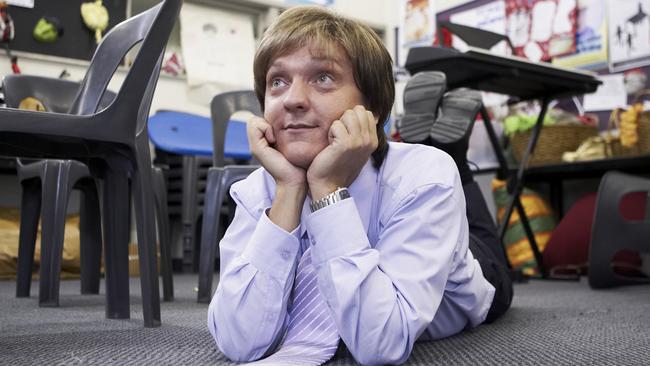
While white performers appearing in black or brown face is clearly offensive, it’s worth noting that just 11 years ago Jonah from Tonga was launched, with considerable fanfare, by the ABC and BBC. In the same year, when reviewing a Lilley box set, a critic for The Guardian called Summer Heights High “a masterclass in character comedy’’.
A recent take-down of Lilley’s podcast by the same publication shows how much things have changed, for Lilley and the broader Australian comedy scene: Guardian reviewer Luke Buckmaster noted how Lilley’s use of black, brown and yellow face had been “a nail in the coffin” of the performer’s career and chastised him for his “weird” and “desperate” desire “to keep his old characters alive through any means possible’’.
Many listeners see Mr G’s Room differently: On Apple podcasts, they have given the show 4.5 out of a possible five stars. This month, it reached the 11th spot on Apple’s national comedy podcasts charts against a field that includes Rogan’s show.
Review asked Lilley for an interview, but he declined.
‘The audience literally booed’
Two years ago, Daniel Muggleton was performing his comedy routine about Australia Day and racism in Mount Gambier, South Australia. “The audience literally booed,’’ he says. “… They’re like, why are you bringing this up at a comedy show?’’
Muggleton asked the hecklers to wait for the punchline. They did, and he was applauded. He begins this routine (which you can view on YouTube) by stating Australia is a racist country but one that is “trying to improve”. He goes on to say he prefers the changing view of Australia Day because “I used to feel weird about being a white Australian all year. Now I can get that done in one day.’’
Such nuanced comedy – acknowledging that racism exists but puncturing his own progressive shallowness – is his schtick. “I’m not trying to change hearts and minds, brother,’’ he tells Review. “I’m not a politician. I’m a guy in a track suit who swears a lot.’’
Muggleton has done two TV specials, and like many emerging and established comedians, he uses clips on social media platforms from TikTok to YouTube to market his live shows. He thinks the notion that Trump was re-elected because of his Rogan interview “is absurd” and radically overstates the podcaster’s influence.
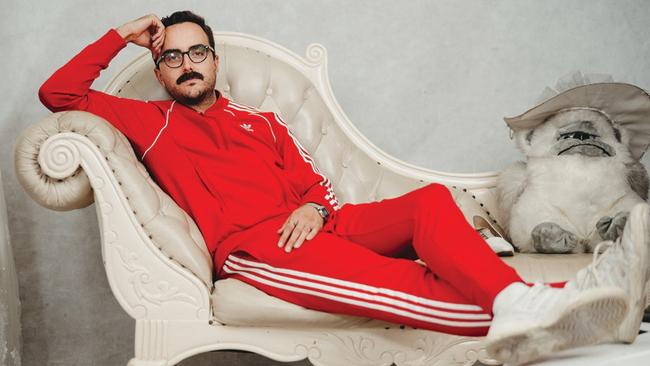
He suggests comedians can take more risks at live performances than they can on television, where they tend to roll out their broadest material. “Most people in a room kind of understand what you’re trying to say,’’ he says, adding that they are unlikely to snitch about a dark or edgy routine. “I think the audience generally want to have a good time. They’re not there to get offended,’’ he says.
Earlier this year, Review attended an alternative comedy performance in which comedians from South Asian and South American backgrounds segued from safe Uber driver gags to riskier jokes about the social tensions between Indians and Pakistanis, why white women are reluctant to date Indian men and white people identifying as Aboriginal. These comedians, who marketed themselves as politically incorrect, had the room in stitches. It’s safe to say many of their gags could never be uttered on mainstream television.
A red nylon tracksuit is Muggleton’s trademark. Lately, the 35-year-old has put the word “white” into his show titles. His previous show was White and Wrong and, as mentioned above, his latest show is titled You May Be White, I May Be Crazy.
Asked why he does this, he says it’s “just for fun” and aimed at questioning the idea of whiteness as the “centre point” of things. He jokes he is thinking of retiring these titles because “I feel like it does give people the wrong idea … Some people come along thinking, ‘It’s going to be like their moment, we’re going to start the movement here tonight brother’.’’ He adds dryly: “That’s not it.’’
Observational comedy – taking the mickey out of the mundane aspects of daily life – is a popular (and safe) genre for Australian comedians, although Provan argues it can be politicised. “It depends on what they’re being observational about,’’ she says.
While comedians Tom Ballard, Will Anderson and Charlie Pickering could be “overtly political”, Provan says, Sri Lankan-Australian comedian Nazeem Hussain, creator of the TV show Orange is the New Brown, could also be political while being “extremely funny and also quite observational’’. Similarly, Zoe Coombs Marr “is very political in the way she talks about gender issues’’.
While conservative commentators have complained that too many ABC comedians lean left, Rolfe says current and former ABC stars such as Shaun Micallef or Kitty Flanagan tend to steer clear of partisan humour. It’s as if local audiences are “a bit sick of politics’’, he says. Despite the lack of a discernible conservative comedy trend in Australia, Rolfe notes that today most comedians market themselves as pushing boundaries. “Everybody who’s in humour must be considered edgy,’’ he says. “… Nobody wants to be considered part of the establishment.’’
LIFE and Kill Tony are streaming on Netflix. You May Be White, I May Be Crazy tours to Newcastle, Sydney, Avoca Beach, Fremantle and Perth from July 11.



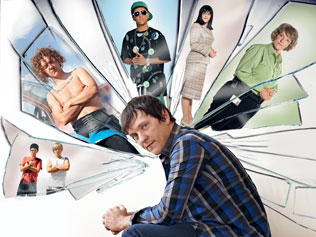
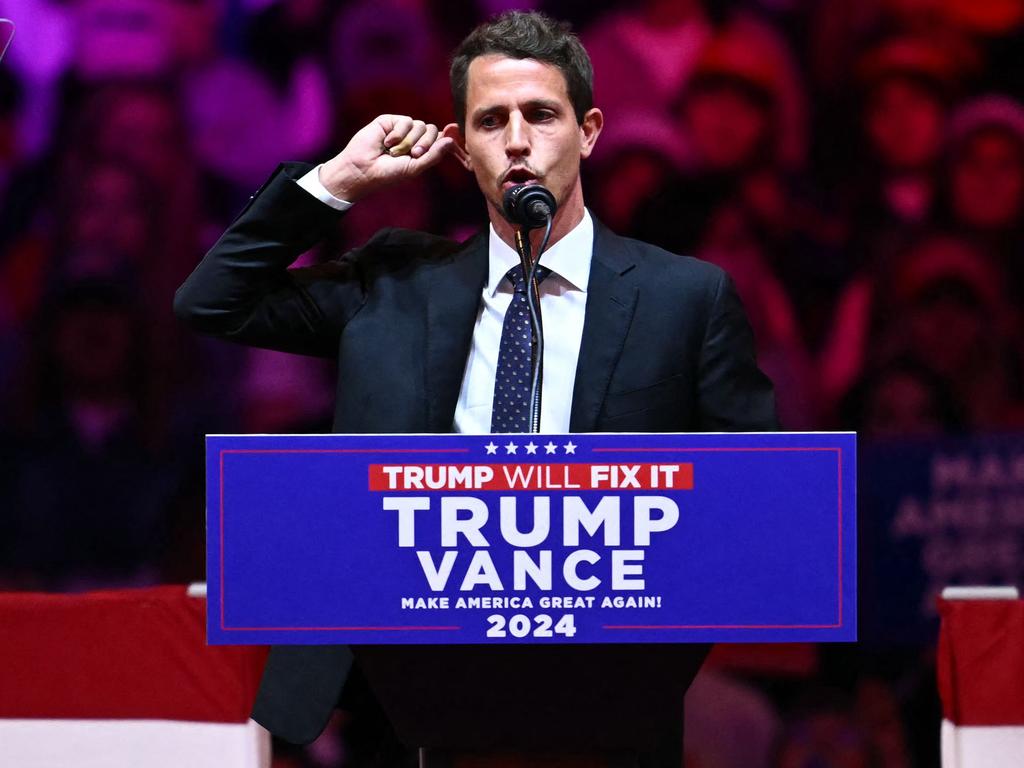
To join the conversation, please log in. Don't have an account? Register
Join the conversation, you are commenting as Logout